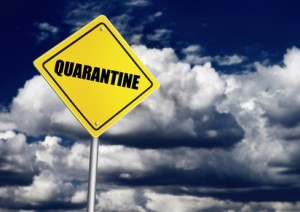The Purpose of Quarantine
Written by Anna Hellman
The first word that should come to mind when bringing a new/sick/recently-traveled horse to your farm is “quarantine”. If you  are bringing a horse across state lines, quarantine is definitely a requirement. As a horse owner, you want to make sure your horses are as protected as possible.
are bringing a horse across state lines, quarantine is definitely a requirement. As a horse owner, you want to make sure your horses are as protected as possible.
The Purpose. Quarantine is used to prevent the spread of communicable diseases. Communicable diseases are those diseases that are easily transferred and can be transmitted from one horse to another. Communicable diseases can be spread in a variety of ways depending on the type of infectious diseases. Some diseases are spread due to direct contact, insects/animals, nasal discharge, airborne spores, contaminated water/feed, etc. In order to prevent against the spread of all these disease transmitters, correct quarantine is absolutely essential. Simply placing a horse in an end stall for a few days is useless. You are still using the same hose to fill up the water buckets, the staff is walking through all the stalls when cleaning them, and when the horses sneeze/cough, the spores fill the air. So here are a few tips in order to make sure you are quarantining your horse as safely as possible.
Pre-Quarantine: Vaccinations. Before any horse is allowed on the property, the owner should double check that the horses’ vaccination records are up to date. It is important to know the diseases common to your area and how regularly the horses should be vaccinated/receive booster shots.
Separate Location & Turnout. On your property, it is necessary to have a quarantine location that is far away from your barn. Many owners prefer to have a run-in shed because it can provide storage for separate supplies. The run-in shed must be able to be closed off in order to contain any possible diseases. Since horses are quarantined for typically 2-3 weeks, it is also necessary to have a paddock large enough that the horse can appropriately move about.
Separate Feed & Water Sources. Having separate sources of food and water is essential to stopping the spread of disease. All buckets, hoses, and scoopers must be kept separate from other equipment. The quarantine location should have its own water pump and the feed should be stored in a closed-off section of the run-in shed.
Proper Care. When owners/staff transition from taking care of the quarantined horses to non-quarantined horses, they must change their clothes, boots, and wash their hands. Some horse owner’s also shower as a precaution to minimize the spread of additional germs. It is also essential that owners/staff do not share any equipment with the horse in quarantines, including feed/water buckets, tack, and grooming supplies.
Post-Quarantine: Sanitation. In the case that a horse does have an infectious disease, sanitation is an absolute requirement. Disinfectant must be used everywhere, including on the floors and the walls. If mats are in the stalls, they must be removed, sanitized, and the floor of the stall must be disinfected as well. If you are ever building a quarantine location, consider making the floors concrete and using mats on top. Concrete is the easiest to disinfect and clean.
It is a hassle to quarantine a horse. It requires a large amount of effort with unpredictable outcomes. I have never heard someone say they regretted putting their horse in quarantine, when that horse turned out to have a communicable disease. The extra work is always worth it if it means maintaining the health of all your horses.
-
Articles
- November 2024
- October 2024
- September 2024
- August 2024
- July 2024
- June 2024
- May 2024
- April 2024
- March 2024
- February 2024
- January 2024
- December 2023
- November 2023
- October 2023
- September 2023
- August 2023
- July 2023
- June 2023
- May 2023
- April 2023
- March 2023
- February 2023
- December 2022
- November 2022
- October 2022
- September 2022
- August 2022
- July 2022
- June 2022
- May 2022
- April 2022
- March 2022
- February 2022
- January 2022
- December 2021
- November 2021
- October 2021
- September 2021
- August 2021
- July 2021
- May 2021
- April 2021
- March 2021
- February 2021
- January 2021
- December 2020
- November 2020
- October 2020
- September 2020
- August 2020
- July 2020
- June 2020
- May 2020
- April 2020
- March 2020
- February 2020
- January 2020
- December 2019
- November 2019
- October 2019
- September 2019
- August 2019
- July 2019
- June 2019
- May 2019
- April 2019
- March 2019
- February 2019
- January 2019
- December 2018
- November 2018
- October 2018
- September 2018
- August 2018
- July 2018
- June 2018
- May 2018
- April 2018
- March 2018
- February 2018
- January 2018
- November 2017
- October 2017
- September 2017
- August 2017
- July 2017
- June 2017
- May 2017
- April 2017
- March 2017
- February 2017
- January 2017
- December 2016
- October 2016
- September 2016
- August 2016
- July 2016
- June 2016
- May 2016
- April 2016
- March 2016
- February 2016
- January 2016
- December 2015
- November 2015
- October 2015
- August 2015
- June 2015
- May 2015
- March 2015
- November 2014
- March 2014
- October 2013
- September 2013
- August 2013
- January 2013
- December 2012
- November 2012
- October 2012
- September 2012
- January 2012
- October 2011
- September 2011
- August 2011
- July 2011
- June 2011
- February 2011
-
Meta





